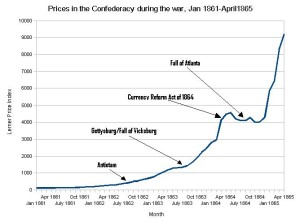As inflation was ravaging the Confederacy 150 years ago, the Virginia state legislature was mulling over a “maximum bill” to regulate prices on a variety of goods. The Richmond city council called a referendum so that Richmond legislators would know their constituents’ wishes on the price ceilings. Today was the day for the vote; here an editorial encourages the enfranchised to vote and to vote against the bill. Price controls can lead to unintended consequences: a consensual maximum price for wheat led to Superman flour prices – “flour has jumped at a single bound to seventy-five dollars”
From the Richmond Daily Dispatch October 22, 1863:
To the Polls! to the Polls!
–To-day is the day fixed by the Council for deciding by a vote of the people the question of instructions to our Senators and Delegates to vote for or against the maximum bill. It is a question of momentous importance, absolutely involving the issues of famine or plenty to this city. The first effect of fixing the price of the necessaries of life will be to cut off the supply. Even now, under the operation of the millers’ maximum, wheat reaches the city in the smallest possible quantities, and flour has jumped at a single bound to seventy-five dollars. The millers have it in their power at any time to correct the evil by removing the restriction. But if the Legislature pass this law, and then adjourn, we shall have to endure all the miseries of a prolonged famine, and all the evils it never fails to bring in its train. The fixing of a maximum price upon manufactures will inevitably close every establishment of that character, and drive every artizan and mechanic from the city to other localities beyond the State, where higher prices are given, and there is no maximum to interfere with the reward of labor. If the manufacturers be compelled to work at fixed wages, and those wages reduced to meet the reduction in the price of manufactured goods. Capital will at once leave the State to seek employment elsewhere. We shall then be a city without food, without capital, without manufactured goods, without employment for our mechanics and laboring people, and all this upon the threshold of a winter, which, for aught we know, may be unusually severe.
Fellow-citizens of Richmond, there never was a time when it more especially behooved every voter who does not wish to plunge his city into unheard-of calamities to go to the polls. Let us hope that there are none disposed to play the laggard on this occasion. That the majority — the large majority — see the fatal tendency of this bill, we have not a doubt. But the revolutionary spirit of those who propose it is in full activity. Those who are desirous to accomplish a particular object are in general more active than those who desire to defeat it. We trust it may be otherwise on this occasion. We trust that every man opposed to this most mischievous scheme will record his vote.
The photo of the wheat stook is from Pennsylvania in July 1943, and the photo of the flours is licensed by Creative Commons



